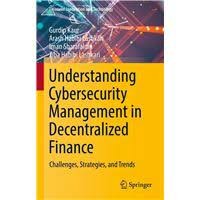
Text
Understanding Cybersecurity Management in Decentralized Finance Challenges, Strategies, and Trends (e-Book Magister Manajemen)
Tidak Tersedia Deskripsi
Ketersediaan
| 20230133 | e-book | Tesis MM | Tersedia |
Informasi Detail
- Judul Seri
-
-
- No. Panggil
-
e-book
- Penerbit
- New York : Springer., 2023
- Deskripsi Fisik
-
200 p
- Bahasa
-
English
- ISBN/ISSN
-
978-3-031-23340-1 (eBook)
- Klasifikasi
-
e-book
- Tipe Isi
-
-
- Tipe Media
-
-
- Tipe Pembawa
-
-
- Edisi
-
-
- Subjek
- Info Detail Spesifik
-
This book discusses understand cybersecurity management in decentralized finance (DeFi). It commences with introducing fundamentals of DeFi and cybersecurity to readers. It emphasizes on the importance of cybersecurity for decentralized finance by illustrating recent cyber breaches, attacks, and financial losses. The book delves into understanding cyber threats and adversaries who can exploit those threats. It advances with cybersecurity threat, vulnerability, and risk management in DeFi. The book helps readers understand cyber threat landscape comprising different threat categories for that can exploit different types of vulnerabilities identified in DeFi. It puts forward prominent threat modelling strategies by focusing on attackers, assets, and software. The book includes the popular blockchains that support DeFi include Ethereum, Binance Smart Chain, Solana, Cardano, Avalanche, Polygon, among others. With so much monetary value associated with all these technologies, the perpetrators are always lured to breach security by exploiting the vulnerabilities that exist in these technologies. For simplicity and clarity, all vulnerabilities are classified into different categories: arithmetic bugs, re-Entrancy attack, race conditions, exception handling, using a weak random generator, timestamp dependency, transaction-ordering dependence and front running, vulnerable libraries, wrong initial assumptions, denial of service, flash loan attacks, and vampire Since decentralized finance infrastructures are the worst affected by cyber-attacks, it is imperative to understand various security issues in different components of DeFi infrastructures and proposes measures to secure all components of DeFi infrastructures. It brings the detailed cybersecurity policies and strategies that can be used to secure financial institutions. Finally, the book provides recommendations to secure DeFi infrastructures from cyber-attacks.
- Pernyataan Tanggungjawab
-
-
Versi lain/terkait
Tidak tersedia versi lain
Lampiran Berkas
Tidak Ada Data
Komentar
Anda harus masuk sebelum memberikan komentar
 Karya Umum
Karya Umum  Filsafat
Filsafat  Agama
Agama  Ilmu-ilmu Sosial
Ilmu-ilmu Sosial  Bahasa
Bahasa  Ilmu-ilmu Murni
Ilmu-ilmu Murni  Ilmu-ilmu Terapan
Ilmu-ilmu Terapan  Kesenian, Hiburan, dan Olahraga
Kesenian, Hiburan, dan Olahraga  Kesusastraan
Kesusastraan  Geografi dan Sejarah
Geografi dan Sejarah